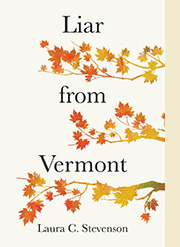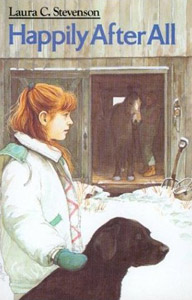A New Series: One Minute Reviews of
Books by Vermont Authors
Laura's column "One Minute Reviews" has appeared bi-weekly in Wilmington, Vermont's Deerfield Valley News since 2015. In April 2018, she found that no Vermont periodical consistently reviews all commercially published fiction and non-fiction by Vermont authors, so she started a series to fill that void. Published reviews from that series and some earlier reviews of local authors are listed with links to a scan of the printed copy. Reviews still in queue are listed without links until they appear in print.
The books reviewed in this series are available through Wilmington's Pettee Memorial Library, the Whitingham Free Public Library, and locally owned Bartleby's Books in Wilmington.
Deerfield Valley News, 9/10/2020
The Weight of the Internet
Makenna Goodman, The Shame. Milkweed Press, 2020
As the book opens, Alma is driving all night to an unknown destination, fantasizing about escaping from a tiny Vermont island surrounded by acres of boiling lava to a pastoral haven of fruit, flowers, and eternal happiness. She achieves this nirvana by shooting migrating geese so they fall into the lava one after another, their half-singed bodies providing her stepping stones. The narrative continues in flashbacks which soon center upon the Vermont homestead where Alma and her husband, Asa, have for the past several years raised sheep and cows, grown their own vegetables and fruit, and sugared their own trees. Asa, we find, teaches at a nearby college; Alma stays home with their two children (ages roughly five and three), bakes bread, preserves food, does dishes, and worries about her artistic and maternal inadequacies. As she drives on, her flashbacks and meditations continue in a first-person voice continually undercut by self-doubt, frustration at "the invisibility" of motherhood, and mixed feelings about the capitalistic world she and Asa have chosen to shun.
In the midst of her journey, Alma reveals that she recently received an offer from a Vermont toy company to write and illustrate two brief, ecological stories about an owl and a raccoon; her work would market the company's stuffed animals, and it would pay well.Initially excited, Alma later decided that the job would commercialize her talent, and she accused Asa's supportive comments as attempts to sell her out. Angrily, she turned back to the novel that she was planning. Unable to accept herself as a sympathetic heroine, she turned to the internet. There, she came across Celeste, a Brooklyn artist-mother with an extensive blog, an active Facebook account, a web cam, and an internet presence of calm, sophistication, and artistic success. Alma's research first turned to deep interest, then to admiration, and finally to a form of addiction that made her measure time not in minutes or hours, but in the time between Celeste's posts.It's Alma's obsession has led to the all-night drive to New York and the book's conclusion.
This short, well-written novel is the fourth Vermont book I have reviewed that is concerned with the internet's influence on women. Two of these—Lizer's Aren't You Forgetting Someone? (5/28/20) and Harrington's Amateur Hour (7/12/18)—are collections of sarcastically witty pieces about motherhood that demonstrate the appeal of "mommy blogs." The third—(Millwood's To Have and to Hold (7/11/19)—suggests that the companionship Facebook seems to offer mothers can easily turn into competition: pictures and texts create online presences whose apparent perfection is beyond the reach of women struggling with the real-life challenges of motherhood.Goodman's Alma is a victim of this competition. The book's title, Goodman has said in a recent Seven Days interview, reflects the feelings "when you're scrolling through image after image after image of lives you could have led, people who could have been,… children who seem happier than your own, or vacations you can't afford.It's just the shame! The shame, the shame!"A great deal of "mental and creative energy" goes into women's public personas, she argues, and "it's really sapping creatively, and really alienating.I wanted to write a book about that." Her portrait of Alma, whose addiction to the public persona of a woman perhaps less talented than herself, is a cautionary tale about Facebook's ability to undercut women's achievements by comparing their real selves to other women's idealized personas. The result, as Alma's marvelously-rendered voice suggests, can be women's endless dissatisfaction with their children, their lives, and their talents.


